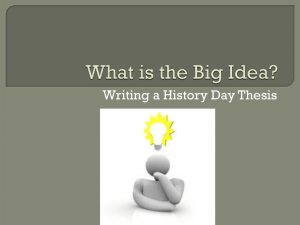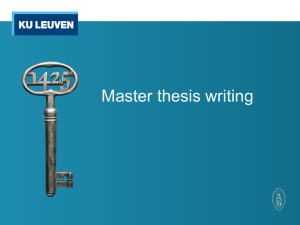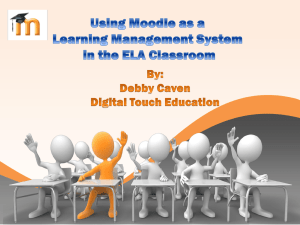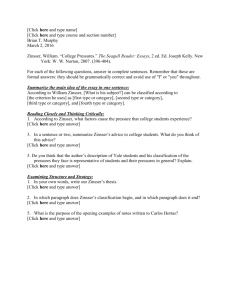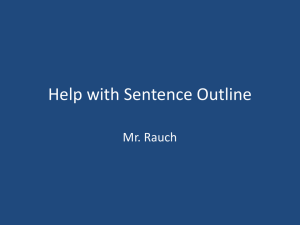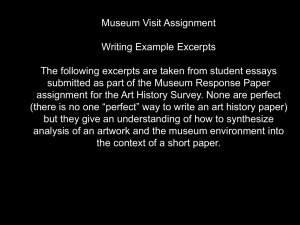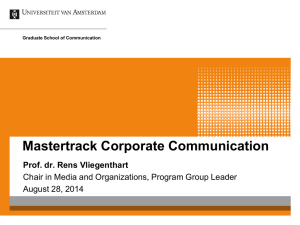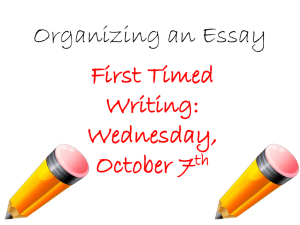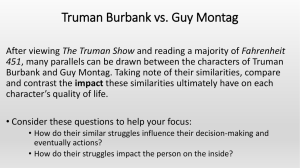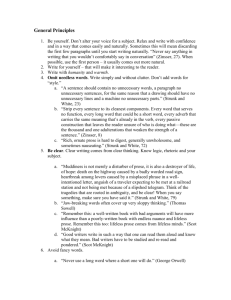Thesis Statements Presentation
advertisement
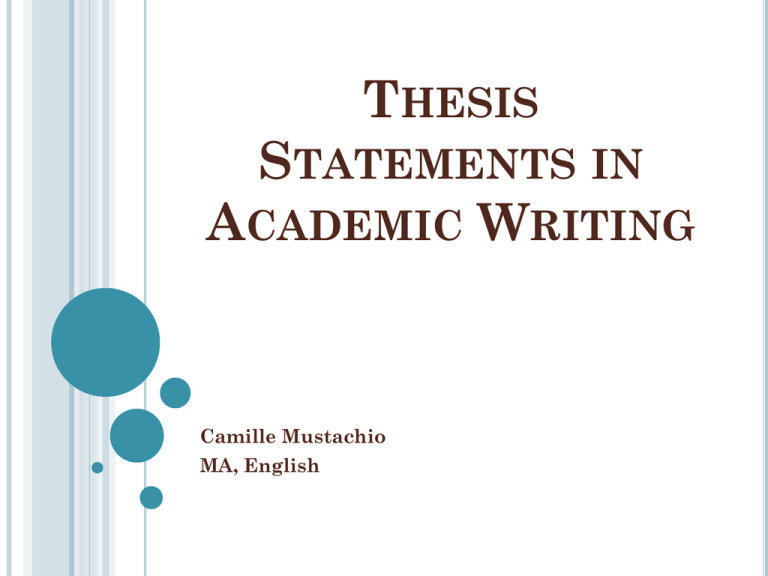
THESIS STATEMENTS IN ACADEMIC WRITING Camille Mustachio MA, English LEARNING OUTCOMES Define a thesis statement. Identify and discuss three key qualities of an effective thesis statement. Locate effective thesis statements in academic writing. Create and discuss thesis statements. A THESIS STATEMENT IS A SENTENCE THAT… clearly presents the main idea of an essay. appears in the introductory paragraph. goes beyond simply stating a fact or making an announcement. provides a strong foundation upon which to build an essay. contains a sufficiently-narrow topic, an opinion or controlling idea about the topic, and a preview of evidence in support of the argument. THREE QUALITIES OF AN EFFECTIVE THESIS STATEMENT Topic Opinion Evidence TOPIC, OPINION, AND EVIDENCE IN ACTION. Year-round school. Downtown revitalization projects improve the community by spurring economic growth. Parents should read The Cat in the Hat to their children. Clubs promote the personal growth of community college students. TOPIC, OPINION, AND EVIDENCE IN ACTION. Year-round school. TOPIC, OPINION, AND EVIDENCE IN ACTION. Year-round school. …should be discouraged because it creates child-care dilemmas without academic benefits. …leads to student success as schools with year-round schedules report higher standardized test-scores and lower academic retention rates than schools with ninemonth schedules. TOPIC, OPINION, AND EVIDENCE IN ACTION. Downtown revitalization projects improve the community by spurring economic growth. TOPIC, OPINION, AND EVIDENCE IN ACTION. Downtown revitalization projects improve the community by spurring economic growth. TOPIC, OPINION, AND EVIDENCE IN ACTION. Parents should read The Cat in the Hat to their children. TOPIC, OPINION, AND EVIDENCE IN ACTION. Parents should read The Cat in the Hat to their children. …since early reading leads to future academic success. …because of the story’s whimsical plot, creative diction, and entertaining images. TOPIC, OPINION, AND EVIDENCE IN ACTION. Clubs promote the personal growth of community college students. TOPIC, OPINION, AND EVIDENCE IN ACTION. Clubs promote the personal growth of community college students. …by creating opportunities for involvement. …since clubs focus on student service, leadership, and fellowship. EFFECTIVE THESIS STATEMENTS IN ACADEMIC WRITING “In ‘College Pressures,’ William Zinsser notes the disappearance of a time when college students ‘journeyed through college with a certain relaxation, sampling a wide variety of courses— music, art, philosophy, classics, anthropology, poetry, religion— that would send them out as liberally educated men and women’ (464). The change in college students’ focus is even more noticeable today than when Zinsser wrote his essay, and it represents a real loss for students. Taking a variety of different kinds of courses can educate students about a wide range of subjects, and it can also teach them about themselves” (Kirszner and Mandell 455). EFFECTIVE THESIS STATEMENTS IN ACADEMIC WRITING “In ‘College Pressures,’ William Zinsser notes the disappearance of a time when college students ‘journeyed through college with a certain relaxation, sampling a wide variety of courses— music, art, philosophy, classics, anthropology, poetry, religion— that would send them out as liberally educated men and women’ (464). The change in college students’ focus is even more noticeable today than when Zinsser wrote his essay, and it represents a real loss for students. Taking a variety of different kinds of courses can educate students about a wide range of subjects, and it can also teach them about themselves” (Kirszner and Mandell 455). EFFECTIVE THESIS STATEMENTS IN ACADEMIC WRITING “In ‘College Pressures,’ William Zinsser notes the disappearance of a time when college students ‘journeyed through college with a certain relaxation, sampling a wide variety of courses— music, art, philosophy, classics, anthropology, poetry, religion— that would send them out as liberally educated men and women’ (464). The change in college students’ focus is even more noticeable today than when Zinsser wrote his essay, and it represents a real loss for students. Taking a variety of different kinds of courses can educate students about a wide range of subjects, and it can also teach them about themselves” (Kirszner and Mandell 455). EFFECTIVE THESIS STATEMENTS IN ACADEMIC WRITING “In ‘College Pressures,’ William Zinsser notes the disappearance of a time when college students ‘journeyed through college with a certain relaxation, sampling a wide variety of courses— music, art, philosophy, classics, anthropology, poetry, religion— that would send them out as liberally educated men and women’ (464). The change in college students’ focus is even more noticeable today than when Zinsser wrote his essay, and it represents a real loss for students. Taking a variety of different kinds of courses can educate students about a wide range of subjects, and it can also teach them about themselves” (Kirszner and Mandell 455). IT’S YOUR TURN! On your own, write a thesis statement that contains the three key qualities of topic, opinion, and evidence. With a partner, compare thesis statements and offer suggestions for improvement. As a class, share favorite thesis statements. FINAL THOUGHTS Move from topic to thesis statement by crafting a sentence that contains a sufficiently-narrow topic, an opinion or controlling idea about the topic, and a preview of evidence in support of the argument. Remember that writing skills improve with practice, so be patient as your skills develop. Utilize your instructors, classmates, and peer tutors for additional support. WORKS CITED Making Sense: A Real-World Rhetorical Reader. Ed. Cheryl Glenn. Boston: Bedford/St. Martin's, 2005. Print. Patterns for College Writing: A Rhetorical Reader and Guide. Eds. Laurie G. Kirszner and Stephen R. Mandell. Boston: Bedford/St. Martin's, 2010. Print. The Writer’s Workplace: With Readings. Eds. Sandra Scarry and John Scarry. Boston: Thomson Wadsworth, 2003. Print.

